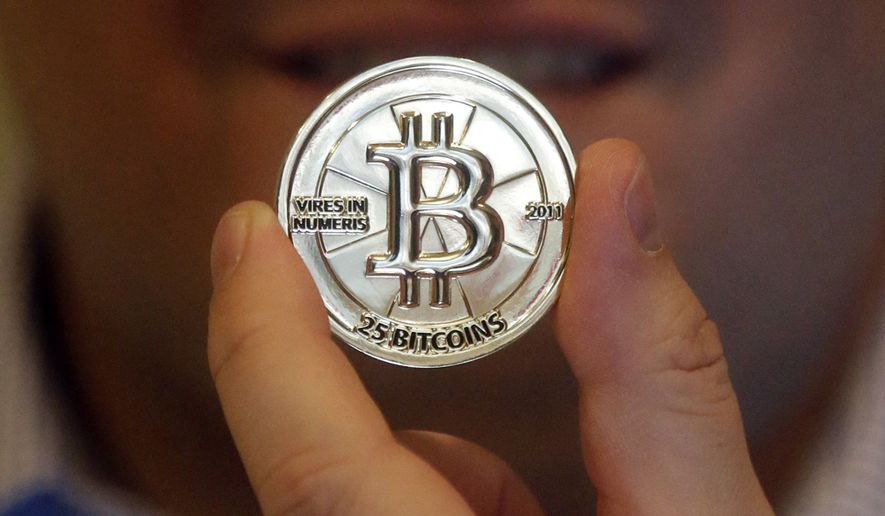The government this week will auction bitcoins seized by authorities from a Russian hacker, a young Mormon accused of being an opioid kingpin and other high-profile cases.
Analysts predict the U.S. Marshals Service will fetch nearly $50 million from Monday’s auction of 3,814 bitcoins. It is described as the largest government auction for the cryptocurrency, whose price has fluctuated wildly.
Lynzey Donahue, a spokeswoman for the Marshals Service, declined to comment on the auction.
The federal government has taken a hard line against bitcoin as a valid currency while simultaneously profiting from it — even giving the imprimatur of value to the insurgent currency, whose supporters want it to usurp the role of the dollar as the world’s financial backbone.
“There might be a tinge of irony here because the beauty of bitcoin is that it is a trustless asset that does not need the backing of a central authority,” said Peter Rodriguez, dean of Rice University’s business school. “It will be interesting to see if there will be a significant price difference when you have bitcoin backed by the government.”
Bitcoin is a cryptocurrency, a form of digital cash that can be transferred online between users without a bank. It is becoming more common despite having limited value outside the internet.
The Marshals Service has sold off hundreds of thousands of bitcoins at auction since 2014. It netted $60 million, which was below market value.
With bitcoin’s volatility, analysts are waiting to see the level of interest in this latest auction.
Most governments don’t recognize bitcoin as a valid currency, and a few countries have prohibited its use. Russia, South Korea and other countries have openly discussed banning bitcoin.
The U.S. has classified bitcoin as a taxable asset similar to a house or boat. But it also has cracked down on its use in the past year. Government officials fear the currency is difficult to track online, making it easier to be used in money laundering or drug transactions than other types of money.
In January 2017, the IRS subpoenaed Coinbase, the world’s largest bitcoin broker, demanding account details for its U.S.-based customers. The Securities and Exchange Commission followed that action by pressing charges against PlexCorps, an initial coin-offering business, saying it defrauded investors.
SEC Chairman Jay Clayton warned investors in December that putting money into cryptocurrencies may violate federal securities law.
Some say the ramped-up enforcement is why bitcoin’s value has plummeted in recent weeks. It was trading at $19,783 on Dec. 17 but dropped 40 percent to $11,4787 in just over a month, according to data from Coindesk, which tracks the bitcoin market.
Yet allowing investors to profit from bitcoin through government-sanctioned auctions appears to send a mixed message about, if not a tacit endorsement of, bitcoin as a currency. Bitcoins acquired by investors for a combined $60 million in four auctions now are worth roughly $143 million.
Mr. Rodriguez said the most recent auction could generate prices above the current market.
Bitcoins typically are purchased on an exchange, and large transactions can result in price fluctuations. The government auctions, however, enable investors to purchase a large number of bitcoins from a credible seller without influencing prices.
“I wouldn’t be surprised if some zealots bid $15,000,” Mr. Rodriguez said. “It would be an unwise choice, but the passion for this is extraordinary.”
The U.S. Marshals are offering the bitcoins as five blocks of 500, five blocks of 100 and one block of 813. All of the bitcoins were seized in criminal investigations.
One lot belonged to Aaron Shamo, a 27-year-old Mormon who is accused of building an opioid empire in suburban Salt Lake City. Although the case is pending, the government is selling his bitcoins, along with two vehicles impounded during the investigation.
Another lot of bitcoins was seized from Alexander Tverdokhlebov, a Russian-born hacker who was convicted of stealing more than 40,000 credit cards and taking control of a half-million computers through malicious software.
Gil Luria, director of international research at D.A. Davidson, a financial services company, said the auction shows the government understands bitcoin’s value.
“This is just like selling a seized yacht or car,” Mr. Luria said. “It is very consistent with the approach of auctioning off anything that has value in the market.”
Each prospective investor must submit a $200,000 deposit before the auctions. All bids must be made via email, and only preregistered individuals will be allowed to participate.
The auction is not open, and bids will remain secret. Winners will be informed of their successful bids on Monday.
• Jeff Mordock can be reached at jmordock@washingtontimes.com.




Please read our comment policy before commenting.